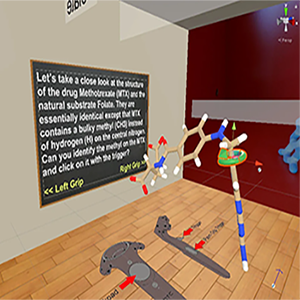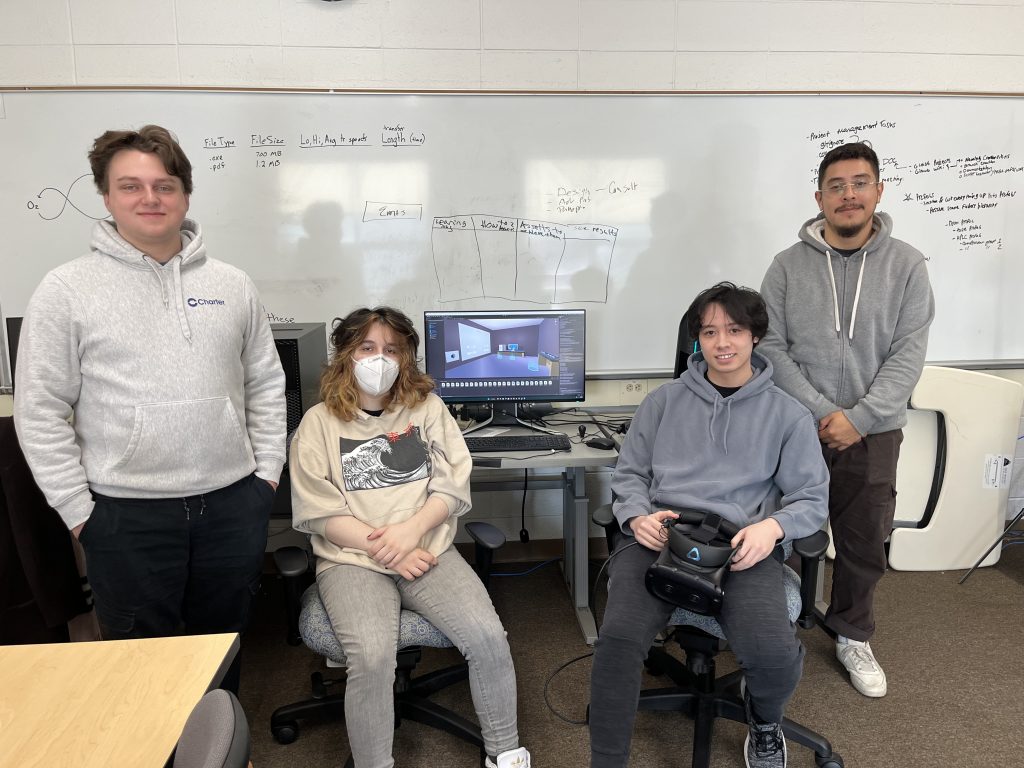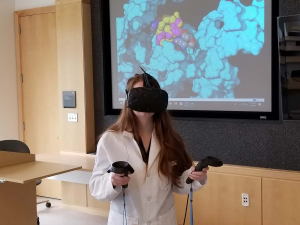
Immersive Learning VR Tools in Action in the College of Pharmacy
High-Performance Liquid Chromatography (HPLC) VR is a way to provide virtual training in the use of HPLC prior to using the actual instrument.
Introduction
Spotlight feature written by: Julia Malyuta
Chris Hemme, Roy Bergstrom, along with David Rowley are collaboratively leading initiatives with researchers and students from the pharmaceutical and computer science communities to advance high school science education through the development of Virtual Reality (VR) projects. The student interns of the VR Lab, including Dylan DiFilippo, Aeyva Rebelo, Luis Hernandez, and Sean Chin, played a large role in the development of the app, as they were the ones mainly working on and creating the app.

Their focus is on creating engaging game-based VR modules designed to enrich the science curriculum. These modules offer students an immersive learning experience, actively involving them in experiments and assessment-based interactions. Notably, they have already achieved success in developing a fully functional module and prototype for undergraduate education within the College of Pharmacy at URI. This pioneering work demonstrates their commitment to leveraging VR technology to transform science education.
High-Performance Liquid Chromatography (HPLC) is a method for rapidly separating and identifying small molecules in a sample. In this case, Dr. Rowley of the Pharmacy department uses it for identifying natural products in environmental samples. The concept of the machine is fairly simple but there are many variations of the concept based on what specific goal you want to accomplish. HPLC VR is a way to provide virtual training in the use of HPLC prior to using the actual instrument.

Q: How was HPLC VR effectively used in practice?
A: HPLC VR is used to introduce students to the basic concepts of small molecule separation using HPLC in a safe and cost-free virtual environment. This served as a preparatory step before students engaged with the actual HPLC instrument in the lab.in practice?
Q: What are the pros and cons of using HPLC VR?
A: Pros include a cost- and consequence-free learning environment, accessibility on Mac and Windows, and preparatory value for students with minimal lab experience. However, limitations include reduced functionality compared to actual HPLC configurations and the inability to fully substitute for hands-on lab experience.
Download RI INBRE Mixed Reality Apps
The apps can be downloaded from Github at https://github.com/riinbre-bioinfo/RI-INBRE-Mixed-Reality-Apps.
Teaching Tool Usage
The HPLC VR tool is an invaluable asset, offering students a safe and cost-free environment to learn the basic concepts of small molecule separation using HPLC. This virtual training tool, available for both Mac and Windows platforms, operates on the Unity framework with Steam VR support. While the tool is cost- and consequence-free, it is acknowledged that its functionality is limited compared to the diverse array of HPLC configurations possible. The VR environment cannot substitute for actual lab experience; rather, its purpose is to familiarize students with the concepts before they engage with the instrument in the physical lab setting.
There is an emphasis on the importance of hands-on experience, acknowledging that the VR tool serves as a preparatory step for students with minimal lab experience. The VR app allows them to grasp basic concepts without the risk of lost samples or broken equipment, providing a foundation before they work with the actual instrument.
Q: What are its unique applications?
A: HPLC VR is particularly effective for providing virtual training in the use of HPLC, serving as a preparatory tool for students with minimal lab experience.
Q: What are the pros and cons of using HPLC VR?
sequence-free learning environment, accessibility on Mac and Windows, and preparatory value for students with minimal lab experience. However, limitations include reduced functionality compared to actual HPLC configurations and the inability to fully substitute for hands-on lab experience.
HPLC VR shines brightest in its application as a virtual training tool for HPLC usage. Specifically designed to introduce students to the concepts of small molecule separation, the tool serves as a valuable preparatory step, especially for those with limited lab experience. Its unique application lies in providing a safe and controlled environment for learning before students engage with the actual HPLC instrument.
Feedback and Experience
Q: What was the initial student feedback about using HPLC VR?
A: Initial feedback indicates a positive response, with students finding it a valuable preparatory tool, particularly for those with minimal lab experience.
Regarding student experience and feedback, the HPLC VR tool has garnered positive initial responses. Students, especially those with minimal lab experience, appreciate its role as a preparatory tool. The virtual environment allows them to grasp basic concepts without the concerns of lost samples or broken equipment. However, like any tool, individual preferences vary, with some finding it less intuitive, and factors such as height influencing the experience in the VR world.
Resources:
RI INBRE Mixed Reality Apps – https://github.com/riinbre-bioinfo/RI-INBRE-Mixed-Reality-Apps
Developing virtual and augmented reality applications for science, technology, engineering and math education- https://pubmed.ncbi.nlm.nih.gov/37291856/
View Previous Ed Tech Faculty Spotlight with Alisa Cox on Lumi
View Previous Ed Tech Faculty Spotlight with Natalie Pifer on Top Hat
View Previous Ed Tech Faculty Spotlight with Alicia Vaandering on Padlet and Powtoon
View Previous Ed Tech Faculty Spotlight with Erika Fiore on Notability
View Previous Ed Tech Faculty Spotlight with Amanda Izenstark on Jamboard
